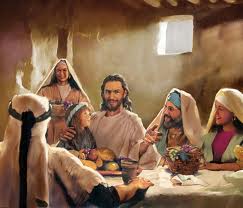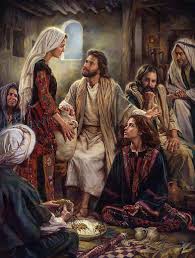
-02-07-2023-
Thirteenth Sunday in Ordinary Time
Gospel reading: Matthew 10:37-42
vs.37 Jesus said to his apostles:
“Anyone who prefers father or mother to me is not worthy of me.
Anyone who prefers son or daughter to me is not worthy of me.
vs.38 Anyone who does not take his cross and follow in my footsteps is not worthy of me.
vs.39 Anyone who finds his life will lose it; anyone who loses his life for my sake will find it.
vs.40 Anyone who welcomes you welcomes me; and those who welcome me welcome the one who sent me.
vs.41 Anyone who welcomes a prophet because he is a prophet will have a prophet’s reward; and anyone who welcomes a holy man because he is a holy man will have a holy man’s reward.
vs.42 If anyone gives so much as a cup of cold water to one of these little ones because he is a disciple, then I tell you solemnly, he will most certainly not lose his reward.”
******************************************
We have four sets of homily notes to choose from.
Please click on the one required or scroll down the page.
We have four sets of homily notes to choose from. Please scroll down the page for the desired one.
Michel DeVerteuil : Holy Ghost Priest and Specialist in Lectio Divina
Thomas O’Loughlin: Professor of Hist. Theology, Uni of Nottingham.
John Littleton: Director of the Priory Institute , Tallaght, D24
Donal Neary SJ: Editor of The Sacred Heart Messenger
*******************************************************
Michel de Verteuil
Lectio Divina with the Sunday Gospels – Year A
www.columba.ie
General Comments
According to the liturgical practice of our Church, when a teaching of Jesus is continued over several weeks, each Sunday’s reading begins with a reminder of the context. Today’s passage therefore begins, “Jesus instructed the twelve as follows”, or “Jesus said to his apostles”. This practice reminds us that in our Catholic tradition we always read the bible “historically” – with the awareness that each book, indeed each passage, was composed in a certain historical context and is also to be read in a historical context.
Applying this principle to today’s passage, we read it not as a list of commands (far less of threats) but as a “story” – this is what Jesus said when he sent his disciples into their world. It is a living story so that in our meditation we ask the question, who is the Jesus who said (is saying) these things – to us? to the modern world? The passage also issues a challenge to us as individuals and as communities (as the Church) – this is how Jesus wants us to be present in the world.
The passage is in two sections, very different both in content and in atmosphere: Verses 37 and 38 speak of the demands Jesus makes on people and wishes his followers to make on their contemporaries. We remember with gratitude the people who have made such demands on us, lifting us out of mediocrity and giving us something for which we are willing to risk everything we hold dear. Martin Luther King once said,
“People who haven’t discovered something they will die for, are not fit to live.”
Each verse ends with “is not worthy of me”. This reminds us that as followers of Jesus we have the option of watering down his teaching in such a way that it is no longer “worthy” of him.
“Prefer” in verse 37 is biblical language, and we must be careful to interpret it correctly. The bible takes for granted that hurting “father or mother”, “son or daughter” causes very deep pain; we must read this verse then as part of the “cross” which Jesus’ followers must “take up” (verse 38), and of “losing one’s life” (verse 39). “Follow in my footsteps” (in verse 38) shows that Jesus only imposes on others what he has imposed on himself.
Verses 37 and 38 can give the impression of Jesus’ followers as a surly lot, suffering from “victim syndrome”; verse 39 corrects such wrong interpretations – the overall effect of the following of Jesus is positive, it calls for self-sacrifice as a way to fuller life. The verse presents two sharply contrasting possibilities; we stay with each one in turn, getting a feeling for both and letting them play off each other like contrasting colours in a painting.
– On the one hand, there is complacency – “I can relax now that I have found what I was looking for”. We feel Jesus’ sadness at mediocrity where there was immense potential.
– On the other hand we feel his exhilaration at people who have taken risks (lost their life) and discovered new vitality (found life).
Verses 40 to 42 speak of the presence of Jesus in his community after he has left them. Many leaders want their followers to be always referring back to them; Jesus is different, he sends his followers out so selflessly and with so much trust that they feel his presence long after they have gone on their own. In accord with the original context of the passage, we focus on ourselves sent into the world by Jesus with our different vocations – as parents, teachers, community leaders, Church ministers etc.
Like all caring leaders Jesus is concerned that his missionaries should be “welcomed”, a powerful image we need to spend time on. We are “welcomed” when we are invited to feel at home with others while at the same time being allowed to remain true to ourselves – a rare and very precious experience.
In verse 40 Jesus tells the twelve, “Don’t be afraid, I am so completely with you that when people welcome you they welcome me”. The secret of non-possessiveness is the sense of “being sent” by a higher power; we find it easier to entrust our authority to others when we remember that it is not “ours” but entrusted to us by God.
In verse 41, we need not make a distinction between “prophet” and “holy man”; they are different names for great people sent by God to a community. The verse brings out that Jesus’ “missionaries” (in the widest sense as explained above) and those who welcome them become one. Missionaries are not “givers of objects” (not even “spiritual objects”); they have had a deep experience and invite others to share in it. We remember times when we experienced that those who welcomed us shared in our blessedness.
In our preaching we tend to stress that God is “offended” by our sins. The God whom Jesus reveals in verse 42 is not concerned about himself. Like a good parent, teacher or church minister, his concern is for the “little ones” he has formed and sent into the world. He fusses over them (note “certainly”) and rewards generously anyone who looks after them. We think of parents who declare themselves “eternally grateful” to a teacher for befriending their children.
The designation “little ones” is very significant. Jesus does not want his missionaries to be overly concerned at being treated with honour or respect. In his eyes, they are (and must see themselves as) “little ones”. As many have noted, one of the root causes of many of the recent clerical scandals is that we church leaders have encouraged the culture of elitism, forgetting that we were sent by the Lord as “little ones” grateful for “as much as a cup of cold water”. We think too of the church’s call to be a humble presence (a little one) in non-Western or non-Christian cultures.
“Only those are great whose faith lifts them higher than themselves and who give themselves entirely to this faith.” …Yves Congar
Lord, we remember with deep gratitude those moments of grace when we had an experience which changed all our values and gave a new direction to our lives:
– we met someone whom we loved more than anyone else in the world;
– a new leader gave our community a new vision for itself;
– we read a book which changed our lives;
– a bible passage touched us deeply.
The experience affected us so much that we looked with new eyes
at those who up to then were very dear to us, father or mother, son or daughter,
we were ready to give up things that up to then were very precious to us.
It was the only attitude worthy of this new call we had received.
Looking back on that moment we realise that had we not made the choice, we would have lost ourselves; because we made it we found ourselves.
Lord, your will is that the message of Jesus should bring life to societies torn apart by racial and ethnic hatred.
Forgive us that we have watered down the message allowing it to be second to father and mother, son and daughter.
Followers of Jesus are concerned to protect their ethnic and class identity but are in fact losing it, whereas if they lost it for your sake they would find it.
Lord, we pray for the leaders of our country. Don’t let them impose burdens on others which they have not borne themselves. Teach them that, like Jesus, they must first take up their cross, and only then invite others to follow in their footsteps.
Lord, we remember today those who are taking an important new step in their lives:
– getting married or becoming parents;
– taking public office;
– committing themselves to a new form of service.
Give them the courage to risk losing themselves, for it is only then that they will find their true selves.
Lord, we thank you that in many countries of the world your Church has made an option for the poor,
– preferring them to father and mother, son and daughter
– risking everything for the sake of the gospel.
It has lost many of its privileges but has found life as the Church of Jesus.
Lord, many leaders today, even in the Church, are concerned only for the important members of the community, for their friends or for those who can help them. We thank you for Jesus and all like him, men and women who feel deeply for the little ones in the community, and are grateful to those who give as much as a cup of cold water to them.
“The more faithfully you listen to the voice within you, the better you will listen to what is sounding outside.” …Dag Hammarskjold
Lord, we thank you for the holy men and women, the prophets you send into our lives. How true it is that when we welcome them we share in their greatness.
Lord, we thank you for sending us into the world as parents, teachers, community leaders, ministers in your church. Don’t let us be possessive of those you entrust to our care.
Don’t let us be possessive of those you entrust to our care.
Help us like Jesus, to have a sense that you sent us, so that when we have done all we have to do, we can let ourselves live in those we have formed, trusting that whoever welcomes them welcomes us
and in welcoming us welcomes you who sent us.
Lord, forgive us that the leaders of your church have come to others with a sense of superiority. We thank you for the times that life teaches them that you have sent them as little ones who are grateful for as much as a cup of cold water to slake their thirst.
**************************************************
Thomas O’Loughlin
Liturgical Resources for the Year of Matthew
www.columba.ie
Introduction to the Celebration
Welcome! Welcome to this assembly of the baptised who have gathered to give thanks to our Father in heaven. ‘Welcome‘: it is such a simple word, and one we use freely and often with little thought. We welcome friends and guests to our homes; from time to time we welcome visitors; we talk about giving and receiving warm welcomes; and we sometimes have little plaques near our front door with ‘Welcome‘ written on them or even have it bound into the weave of the front door mat.
Because we have been baptised into Jesus, the Christ, we have been welcomed by the Father as his daughters and sons. Because we are disciples we are welcomed now to the Lord’s table. Because we are followers of the Way we look forward to being welcomed to the banquet of heaven. We can thank the Father that we are a welcomed people.
But do we always welcome the Christ in his teachings in our lives?
*Do we always welcome the Christ in the stranger?
*or always welcome the Christ in the poor? and those in need in our society?
Homily Notes
1. It is always worth giving time to a few unpalatable facts!
Here is one: religions are forces for conservatism in societies – in effect changes (such as the arrival of new people) tend to be seen as frightening and sources of danger.
Here is another: religions tend to build cohesion between groups that engage in ritual together – in effect they establish a status quo that becomes increasingly rigid and adverse to change (so adding hymns that make the assembly more friendly to parents with young children will be a war of attrition. ‘Attrition” in its military rather than its theological sense!).
Here is a third: most religious groups tend to have high perceptions of their own identity and so, in effect, become either excluding of members drifting in from outside or positively exclusive. In effect, you might come to the group as a visitor, but either you would always feel on the periphery as a ‘blow in‘ or you would get a set of signals that this was not really your kind of place.
2. This might appear to be an interesting piece of religious anthropology, but it certainly would not apply to our community: surely it was only last week that we all shook hands at coffee with the two foreigners that bought the house round the corner that old Mrs Smith lived in!
Alas, there is a fourth fact: we all drift down this route of being unwelcoming and must positively choose to act differently if we are to answer the Lord’s call to be welcoming. We want to be like this precisely because we have been so warmly welcomed Are they represented pro rata in the groups in the church? Does the community only reflect the liturgical needs of the middle-aged or the young  families? Does the community show its acceptance of immigrants from other cultures in those who read or assist with the sharing of the Eucharist? These are hard questions for any community because it tests ‘welcoming‘ by practice. And, once someone says in reply: ‘But they don’t want to be involved anyway!’ you can be certain the community has a problem because they are already thinking of brothers and sisters in Christ in terms of ‘them’ and ‘us’.
families? Does the community show its acceptance of immigrants from other cultures in those who read or assist with the sharing of the Eucharist? These are hard questions for any community because it tests ‘welcoming‘ by practice. And, once someone says in reply: ‘But they don’t want to be involved anyway!’ you can be certain the community has a problem because they are already thinking of brothers and sisters in Christ in terms of ‘them’ and ‘us’.
3. Every congregation, and every group within it, must audit its practice: is this group inclusive and including; or is this group exclusive or excluding; are there subtle signals being sent out that there are ‘insiders’ and ‘outsiders‘; are there ways of sending out subtle signals that we are all poor and needy of the Lord’s mercy and glad to be welcomed to the Lord’s table?
 4. If the perfect expression of our existence as the church ~ our gathering for the Eucharist – is an event of true welcome, then those attitudes of welcome and social concern will begin to embed themselves in the community’s discipleship as a whole.
4. If the perfect expression of our existence as the church ~ our gathering for the Eucharist – is an event of true welcome, then those attitudes of welcome and social concern will begin to embed themselves in the community’s discipleship as a whole.
And the converse also hold true: if a community cannot be genuinely welcoming in its liturgy, then it is most unlikely that it will be concerned with the poor, the needy, or the stranger.
******************************************
John Litteton
Journeying through the Year of Matthew
www.Columba.ie
Gospel Reflection
Rocketing divorce rates and the now widespread practice of cohabitation in preference to marriage are two examples among numerous of the difficulty, especially in western societies, of people making lasting commitments to one another. Even many couples who claim to love each other are reluctant to make vows that bind them for life.
This apparent inability to make definitive commitments has also affected the priesthood and religious life. After the Second Vatican Council (1962-1965), many priests and religious abandoned their commitment in their droves. Nowadays it is not uncommon to hear the suggestion that priesthood and religious life should only be a temporary arrangement, that young people might commit to these lifestyles for a specified period of time and then be free to do other things.
 Jesus was very clear about the commitment that he expects from his disciples: ‘Anyone who prefers father or mother to me is not worthy of me. Anyone who prefers son or daughter to me is not worthy of me. Anyone who does not take his cross and follow in my footsteps is not worthy of me’ (Mt 10:37-38). Christians are called to put Christ first. Total commitment, nothing less, is required.
Jesus was very clear about the commitment that he expects from his disciples: ‘Anyone who prefers father or mother to me is not worthy of me. Anyone who prefers son or daughter to me is not worthy of me. Anyone who does not take his cross and follow in my footsteps is not worthy of me’ (Mt 10:37-38). Christians are called to put Christ first. Total commitment, nothing less, is required.
In the scale of relationships, then, Christ is unquestionably first. Not even the closest of family relationships is more important than our relationship with Christ. Nothing less than total commitment is acceptable. The same applies in the case of suffering. Whatever sufferings come our way, whether physical illness or mental anguish or spiritual distress, we accept them for the love of Christ.
To underline the importance of nourishing this total commitment of his followers, Jesus promised rewards to those who give even a drink of water to those in need. It is incumbent on us, then, to re-examine our Christian commitment.
For example, how do we understand the obligation to attend Sunday Mass? For some of us, it may be based on a sort of turgid duty that arises from fear or guilt. For others, it may be due to an unreflected lifelong habit. Or it may be a result of our love of God and the desire to offer praise and worship in the context of a believing community.
If our religious observance is to be transformed into a duty of love, then we need to reflect carefully on the words of Jesus that no human being, nothing on the face of the earth, should be more important to us than him. Only when we appreciate the pre-eminence of Jesus in our lives, will everything else fall into its correct perspective.
For meditation
Anyone who welcomes you welcomes me; and those who welcome me welcome the one who sent me. (Mt 10:40)
***********************************************************************Fr Donal Neary, S.J
Gospel Reflections for the Year of Matthew
www.messenger.ie/bookshop/
A Simple Cup of Water
The examples are stark in the gospel today: about not preferring mother and father to Jesus; about how, in our care for others, we care for Jesus, and how, in our neglect of others, we neglect him. We need to go beyond the practical example to finding out what is central in our lives and how we see God as central. When God is central, our love can be in the smallest of services to people, like ‘the cup of cold water’.
 Jesus is not central outside our humanity, and our human relationships. In the real needs of ordinary people we meet his needs. We give the ‘cup of cold water’ to the person who needs it, not just to Jesus. It’s like many stories in the gospel of Jesus helping those in real need. This is the central point of faith.
Jesus is not central outside our humanity, and our human relationships. In the real needs of ordinary people we meet his needs. We give the ‘cup of cold water’ to the person who needs it, not just to Jesus. It’s like many stories in the gospel of Jesus helping those in real need. This is the central point of faith.
We help in simple ways. This is what Pope Francis refers to in his encouragement of simple love,
-‘like the warm supper we look forward to at night,
– the early lunch awaiting someone who gets up early to go to work. – – Homely gestures.
Like a blessing before we go to bed, or a hug after we return from a hard day’s work. Love is shown by little things,
-by attention to small daily signs which make us feel at home. Faith grows when it is lived and shaped by love’ (September 2015).
Recall a time when someone helped you in a small way. Be grateful.
Offer yourself to do the same when you can.
Make me, O Lord, a channel of your peace and love
when I see the needs of others.
************************